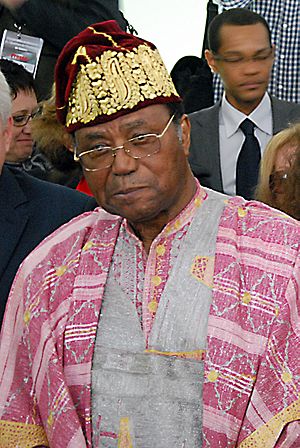Nicéphore Soglo facts for kids
Quick facts for kids
Nicéphore Soglo
|
|
|---|---|

Soglo in 2012
|
|
| 5th President of Benin | |
| In office 4 April 1991 – 4 April 1996 |
|
| Preceded by | Mathieu Kérékou |
| Succeeded by | Mathieu Kérékou |
| Prime Minister of Benin | |
| In office 12 March 1990 – 4 April 1991 |
|
| Preceded by | Maurice Kouandété (1968) |
| Succeeded by | Adrien Houngbédji (1996) |
| Personal details | |
| Born | 29 November 1934 Badou, French Togoland |
| Political party | Renaissance Party of Benin |
| Spouse |
Rosine Vieyra Soglo
(m. 1958; |
| Children | Léhady Soglo Ganiou Soglo |
| Signature |  |
Nicéphore Dieudonné Soglo, born on November 29, 1934, is an important politician from Benin. He served as the Prime Minister of Benin from 1990 to 1991. Later, he became the President of Benin and held that position from 1991 to 1996. He was also the Mayor of Cotonou, a major city in Benin, from 2003 to 2015. Nicéphore Soglo was married to Rosine Vieyra Soglo, who was also a politician and the former First Lady of Benin.
Contents
Early Life and Education
Nicéphore Soglo was born in French Togoland. He went to school in France, where he studied law and economics at the University of Paris. He also attended the École nationale d'administration, a famous school in France.
While studying in France in 1947, he met Rosine Vieyra, who would later become his wife. They were both teenagers from Benin. Nicéphore and Rosine got married on July 2, 1958. They had two sons: Léhady Soglo, born in 1960, and Ganiou Soglo, born in 1962.
Early Career and International Work
After finishing his studies, Soglo returned to Benin, which was then called Dahomey. He worked as an inspector of finance from 1965 to 1967. His cousin, Colonel Christophe Soglo, became president and appointed Nicéphore as the minister of finance and economic affairs.
In 1972, there was a change in government, and Mathieu Kérékou came to power. Nicéphore Soglo then left Benin. He worked for important international groups like the International Monetary Fund (IMF) and the World Bank. These organizations help countries with their money and development.
Becoming Prime Minister
In the late 1980s, people in Benin were unhappy with the country's economy. The government decided to hold a special meeting to discuss how to bring democracy to Benin. This meeting chose Nicéphore Soglo to be the Prime Minister. He started this job on March 12, 1990.
The meeting also created a new constitution for Benin. The people of Benin voted on this constitution on December 2, 1990, and they approved it.
President of Benin
In 1991, Benin held its first presidential election with many different political parties. Nicéphore Soglo won the first round of voting on March 10, 1991. He then went against Mathieu Kérékou in a second round on March 24. Soglo won with a large number of votes, getting 67.73%. This was a big moment because it was the first time an opposition candidate in a French-speaking African country won an election after colonial rule. He became President on April 4, 1991.
In 1992, Nicéphore Soglo's wife, Rosine Vieyra Soglo, started a political party called the Renaissance Party of Benin. Nicéphore Soglo became the leader of this party in 1994.
In 1993, President Soglo led Benin's team to a big meeting in Tokyo, Japan. This meeting was about helping African countries develop.
Economic Challenges and Human Rights
During his time as president, Soglo worked hard to fix Benin's economy, which was in trouble. His economic plans sometimes caused public protests and made him less popular. However, his government was praised for following democratic rules and respecting human rights.
Presidential Elections in 1996 and 2001
In the March 1996 presidential election, Soglo again won the first round. But in the second round, he lost to Mathieu Kérékou. Soglo said there was cheating in the election, but the court did not agree. He is sometimes called "Benin's Walesa", comparing him to a famous leader who fought for democracy.
Soglo tried to become president again in the March 2001 election. He came in second place behind Mathieu Kérékou. Soglo was supposed to go into a second round of voting, but he decided to pull out. He said there were problems with the election. Because he withdrew, Kérékou won the election.
Nicéphore Soglo could not run in the March 2006 presidential election because of an age limit (70 years old). His son, Léhady Soglo, ran for the Renaissance Party instead. Another son, Ganiou Soglo, also ran but did not get many votes.
Mayor of Cotonou
Nicéphore Soglo and his party won the local election in Cotonou, Benin's largest city, in late 2002 and early 2003. On February 13, 2003, Soglo was chosen by the city council to be the Mayor of Cotonou. He received support from 41 out of 45 council members. He promised to work on reducing pollution and improving how the city handles waste and drainage.
In February 2005, there was a false report that Soglo had passed away while in a hospital in Paris.
Soglo ran for re-election as a city council member in Cotonou in April 2008. He also ran for Mayor again, promising to keep making the city modern and to create a public transportation system. On June 3, 2008, the city council re-elected him as Mayor. He received 48 votes in favor.
His son, Léhady Soglo, who had been his deputy, later took over as Mayor of Cotonou.
See also
 In Spanish: Nicéphore Soglo para niños
In Spanish: Nicéphore Soglo para niños
- Timeline of Cotonou, 2000s–present
 | Calvin Brent |
 | Walter T. Bailey |
 | Martha Cassell Thompson |
 | Alberta Jeannette Cassell |

